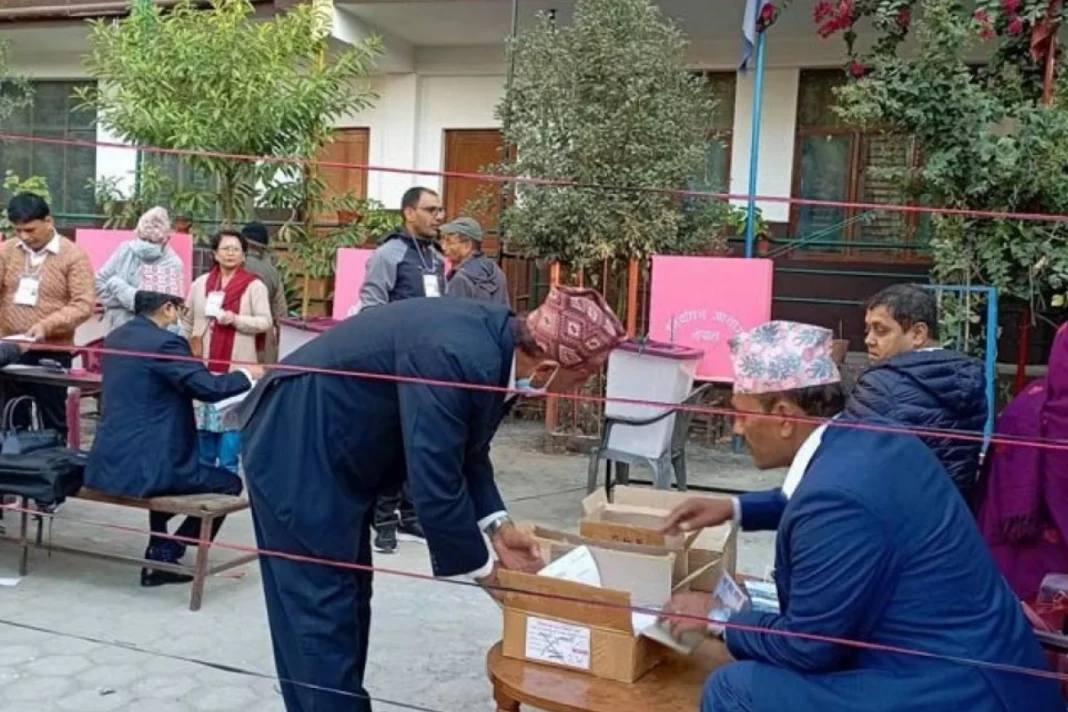Nepal Election: The Himalayan kingdom of Nepal has always been a crucial point of interest for India – be it political turmoil or natural calamity India has been enmeshed in the internal affairs of Nepal for its close proximity and common borders. Political instability has been a recurrent feature of Nepal’s Parliament since the decade-old Maoist insurgency and no Prime Minister has served his full term. Political observers closely watching the current elections have predicted another hung parliament and a government that is unlikely to provide the required political stability in Nepal.
The Himalayan Kingdom of Nepal goes to poll for electing a New Parliament and Provincial Assemblies. Counting to Start Tonight (Sunday) at 9.00 PM, the Chief Election Commissioner Dinesh Kumar Thapaliya declared.
Amid 4.2 to 6.3 magnitudes of earthquake strikes in various parts of Nepal, millions of Nepalese began voting on Sunday to elect a new parliament and provincial assemblies, with a hope to end the political instability that has plagued the country for more than a decade and impeded overall growth. The polling started at 7 am local time at over 22,000 polling centres and closed at 5 pm.
The Election Commission would declare all the first-past-the-post results in the next eight days while the results of proportional representation elections would be announced by December 8. More than 17.9 million eligible voters will elect a 275-member House of Representatives. Out of a total of 275 Members of Parliament, 165 will be elected through direct voting, while the remaining 110 will be elected through a proportional electoral system.
At the same time, voters will also choose representatives to seven provincial assemblies. Out of a total of 550 members of the provincial assemblies, 330 will be elected directly and 220 will be elected through the proportional method. Political observers closely watching the elections have again predicted a hung parliament and a government that is unlikely to provide the required political stability in Nepal.
Also Read: Microsoft: Now Teams allows you to use sign language, We tell you how
Political instability has been a recurrent feature of Nepal’s Parliament
Political instability has been a recurrent feature of Nepal’s Parliament since the end of the decade-long Maoist insurgency, and no prime minister has served a full term after the civil war ended in 2006. The frequent changes and fighting among parties have been blamed for the country’s slow economic growth.
There are two major political alliances contesting the polls — the ruling Nepali Congress-led democratic and leftist alliance and the CPN-UML-led leftist and pro-Hindu, pro-monarchy alliance.
Nepali Congress led by Prime Minister Sher Bahadur Deuba, 76, has formed an electoral alliance with former Maoist guerrilla leader Pushpa Kamal Dahal Prachanda’, 67, against former premier K P Sharma Oli, 70.
The next government will face challenges of keeping a stable political administration, reviving the tourism industry and balancing ties with neighbours — India and China.
The present elections in Nepal is significant for India
The present elections in Nepal are significant as India has played a very supportive role in Nepal’s peace process, although the 2017 Elections were all about China and its distinctive role in internal politics, and a contest with India’s clout in the Himalayan kingdom.
India this time, for sure, is in a better position than in the 2017 elections. Since the splits within the Nepal Communist Party (NCP) in early 2021, the political background in Nepal has tilted in India’s favour. For these upcoming elections too, China’s policy has been to re-engineer a Communist unification.
Though Chinese officials have made several visits recently—including one from Li Zhanshu, chairman of the standing committee of the National People’s Congress—China’s plan has not succeeded so far. On the other hand, India’s key strategy for these elections has been seemingly restricted to checking the Communist unification. Till now, India has been successful in its plan to thwart a Chinese Communist consolidation. Nevertheless, the more important question for India is – Does blocking Communist unity to counter China’s growing influence guarantee its long-term objectives in Nepal?
India’s approach toward Nepal in recent times has shown great diplomatic maturity
India’s approach toward Nepal in recent times has shown great diplomatic maturity in recent times, with less high-handedness in its dealings. However, what India has still failed to understand is that as it climbs up in global power and economic prosperity, its open-bordered neighbour – Nepal – cannot be left behind. Unless Nepal is taken together in economic stability, securing financial prosperity for the local populace, there is always a risk of vulnerable unemployed youths being radicalised—as happened with the 1990s Maoists’ armed movement in Nepal. With general discontentment among youth high, such home-grown uprisings can be easily exploited by external forces looking to jeopardize India’s security.
So, India should not leave Nepal behind with its enormous economic growth. The engine of overall growth and development in India should have a bearing on Nepal and a systematic growth-oriented strategy need to be developed by the think tanks of both the neighbouring nations.
Keep watching our YouTube Channel ‘DNP INDIA’. Also, please subscribe and follow us on FACEBOOK, INSTAGRAM, and TWITTER.


